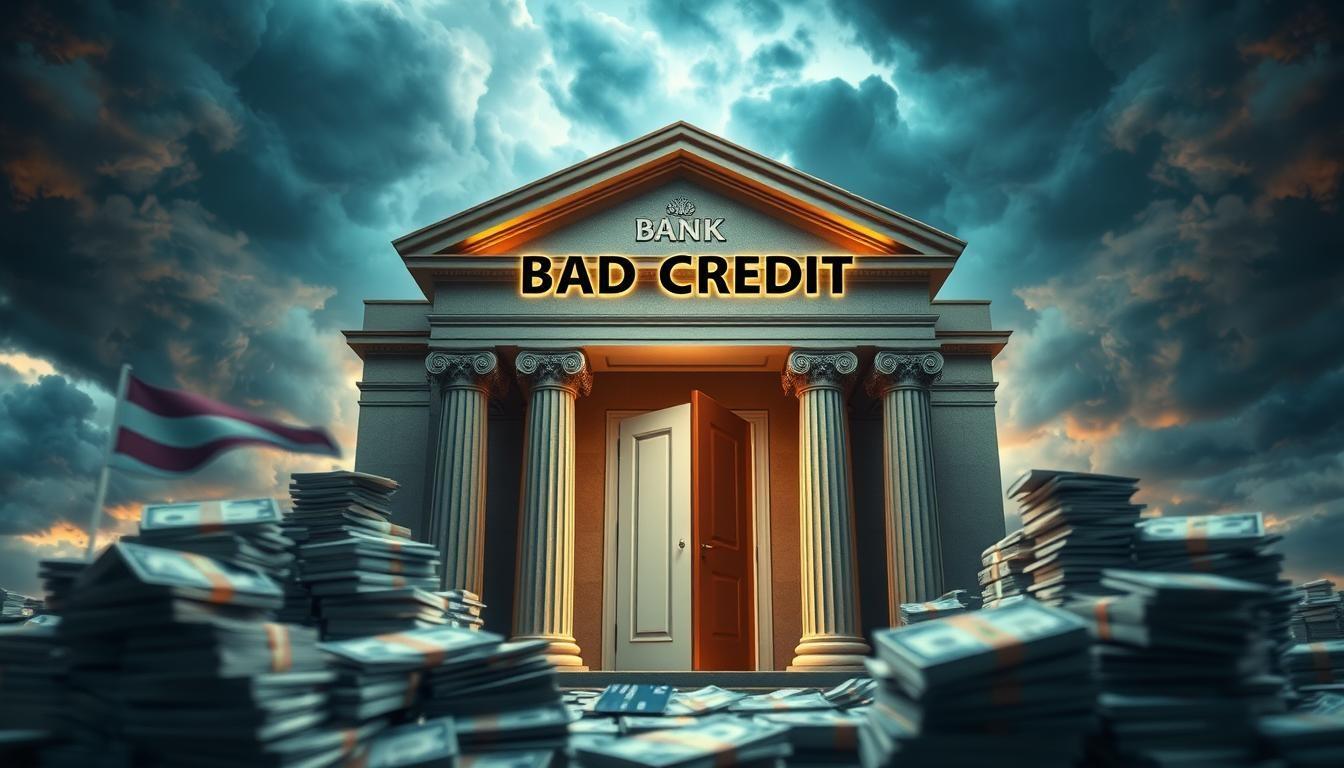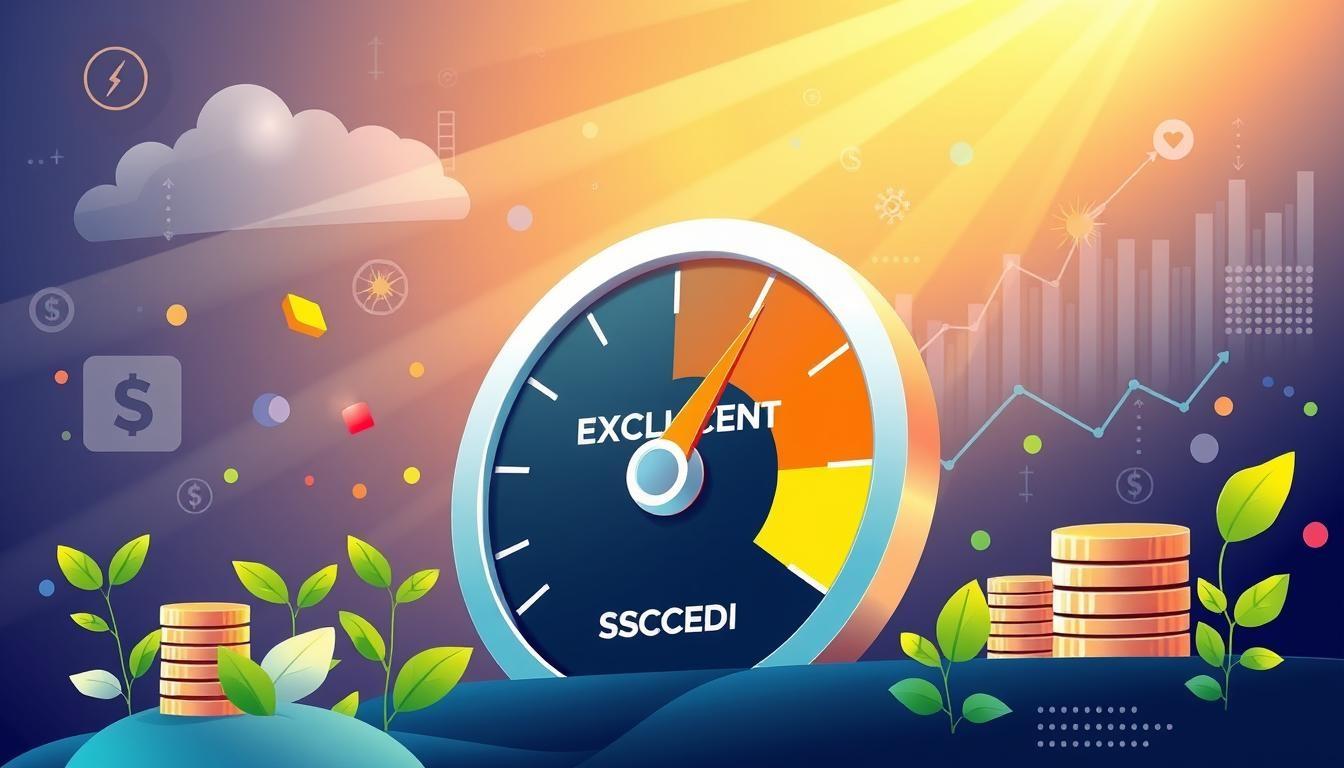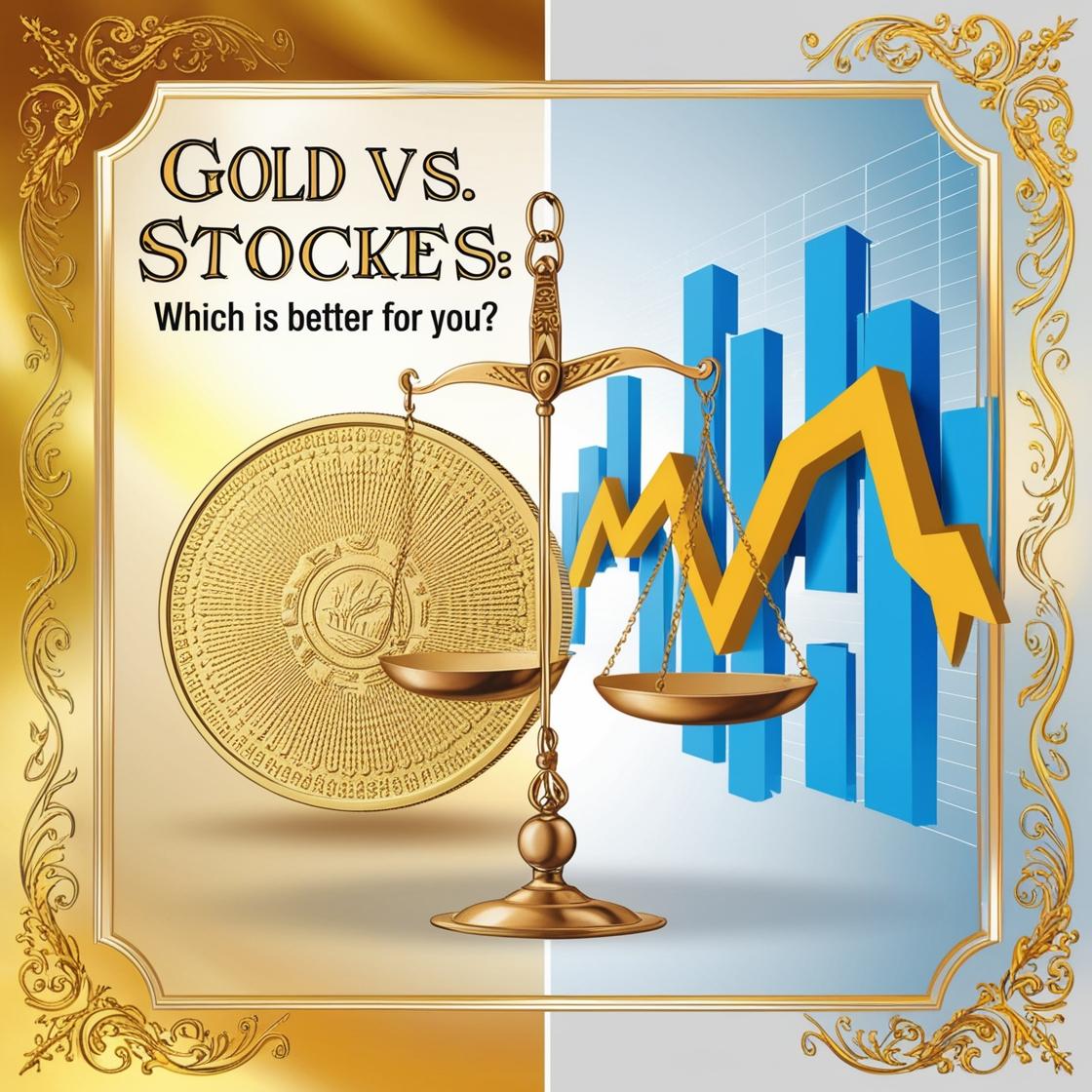Having bad credit can make getting a personal loan tough. But, there are still ways to get one. This article will show you where to find personal loans for bad credit. We’ll also talk about how bad credit affects you and how to boost your approval chances.
Key Takeaways
- Bad credit can make it difficult to obtain a personal loan, but there are still options available.
- Online lenders, credit unions, and some banks may be more willing to work with borrowers with bad credit.
- Secured loans and peer-to-peer lending can also be viable options for those with low credit scores.
- Improving your credit score, providing collateral, and demonstrating financial stability can increase your chances of getting a personal loan with bad credit.
- Carefully compare lenders, interest rates, and terms to find the best personal loan for your needs and budget.
Understanding Bad Credit and Its Impact
Knowing what “bad credit” means and how it affects your scores is key for getting personal loans. Let’s look into the details and see how your credit can shape your financial path.
What is Bad Credit?
Bad credit usually means a score under 670 on the FICO scale or under 700 on the VantageScore scale. This shows lenders you might be a higher risk. It could be because you’ve missed payments, have too much debt, or other issues that make it hard to get loans.
Factors Affecting Credit Scores
Credit scores are based on several important factors:
- Payment History: Making payments on time is key, making up 35% of your FICO score.
- Credit Utilization: Using less than 30% of your available credit is good, making up 30% of your score.
- Length of Credit History: The longer your credit history, the better, making up 15% of your score.
- Credit Mix: Having different types of credit can help, making up 10% of your score.
- New Credit: Getting new credit can lower your score by 10% temporarily.
Grasping these factors and their role in your credit score is vital when looking for personal loans with bad credit.
| Credit Score Range | Categorization | Approval Likelihood |
|---|---|---|
| 800-850 | Excellent | Very High |
| 740-799 | Good | High |
| 670-739 | Fair | Moderate |
| 580-669 | Poor | Low |
| 500-579 | Very Poor | Very Low |
By understanding bad credit and its score factors, you can work to improve your financial health. This can help you get better personal loan terms.
Where to Get a Personal Loan with Bad Credit
Getting a personal loan with bad credit can be tough, but it’s not out of the question. There are lenders who help people with poor credit. They offer different benefits and things to consider. Let’s look at the options for where to get a personal loan with bad credit and lenders for personal loans with poor credit.
Online Lenders for Bad Credit Loans
Online lenders are a top pick for those with bad credit. They often have easier credit rules and a quick, easy application. Some top online lenders for bad credit personal loans are:
- Avant
- Upstart
- Prosper
- LendingPoint
Credit Unions for Bad Credit Personal Loans
Credit unions are owned by their members and can be a good choice for where to get a personal loan with bad credit. They tend to be more flexible and willing to work with people who have credit issues.
Banks for Bad Credit Personal Loans
Even though banks are strict, some might still lend to people with bad credit. Online banks are especially open to this group. It’s worth checking both traditional and online banks for lenders for personal loans with poor credit.
| Lender Type | Advantages | Disadvantages |
|---|---|---|
| Online Lenders |
|
|
| Credit Unions |
|
|
| Banks |
|
|
When looking for where to get a personal loan with bad credit and lenders for personal loans with poor credit, compare what different lenders offer. Look at their features, rates, and terms to find the best one for you.
Online Lenders for Bad Credit Loans
Online lenders offer a convenient way to get personal loans even with bad credit. These platforms have changed how people with poor credit can get the money they need.
Benefits of Online Lenders
Online lenders are known for their quick approval process. Unlike banks, which can take a long time, online lenders can decide in minutes. This is a big help for those who need money fast.
They also have more flexible rules. Online lenders look at your overall financial health, not just your credit score. This makes them a good choice for those with bad credit who can’t get loans elsewhere.
Potential Drawbacks
However, online lenders have some downsides. They might charge higher interest rates or fees. This is because they take on more risk by lending to people with bad credit.
Another drawback is the lack of personal service. Online lending is fast and easy, but it can feel impersonal. Some people miss the face-to-face help they get at banks or credit unions.
When looking at online personal loans for bad credit, think about the pros and cons. Knowing the advantages and disadvantages of online lenders helps you make a choice that fits your financial situation.
Credit Unions for Bad Credit Personal Loans
For those with poor credit, credit unions offer a great option for personal loans. They differ from banks by focusing on your unique situation, not just your credit score.
Getting a bad credit loan from a credit union has many benefits:
- Lower Interest Rates: Credit unions often have lower interest rates on personal loans. This makes them a more affordable choice for those with bad credit.
- Flexible Eligibility Requirements: Credit unions might be more flexible with credit scores. They look at your job history, income, and overall financial health too.
- Personalized Service: Credit unions are known for their personalized service. This is very helpful for those with complex financial situations.
The application process for credit union personal loans for bad credit is simple and clear. You’ll need to share basic financial details like your income, job status, and debts. The credit union will use this info to review your loan application.
In summary, the benefits of getting a bad credit loan from a credit union are clear. They offer competitive rates, flexible terms, and personal attention. This makes credit unions a key resource for improving your financial situation.
| Feature | Credit Unions | Traditional Banks |
|---|---|---|
| Interest Rates | Lower | Higher |
| Eligibility Requirements | More Flexible | Stricter |
| Customer Service | More Personalized | Less Personalized |
Bad Credit Loan Options from Banks
Banks can offer personal loans even if you have bad credit. Traditional banks might be careful, but online banks are getting more open. We’ll look at what both types of banks offer, so you can choose wisely.
Traditional Banks
Traditional banks are a common place to get personal loans. But, they usually need good credit. Still, some might help if you’ve been a customer for a long time or can offer something as collateral.
Online Banks
Online banks are becoming a good choice for loans, even with bad credit. They look at more than just your credit score. They might consider your income, job history, and how much debt you have. So, online banks might say yes to loans that traditional banks won’t.
| Feature | Traditional Banks | Online Banks |
|---|---|---|
| Credit Requirements | Strict | More Flexible |
| Application Process | In-Person | Online |
| Loan Amounts | Typically Higher | Typically Lower |
| Interest Rates | May Be Higher | May Be Lower |
When picking between traditional bank vs. online bank options for a personal loans for bad credit from banks, think about what’s best for you. Look at the good and bad of each to make the right choice.
Peer-to-Peer Lending for Bad Credit
For those with poor credit, peer-to-peer (P2P) lending platforms can be a game-changer. Unlike traditional lenders, P2P lending connects borrowers directly with investors. This approach can open doors for those who might otherwise struggle to get financing.
The process is simple. Borrowers create an account on a P2P platform like Lending Club or Prosper. They then submit a loan application. The platform assesses their creditworthiness and assigns a risk rating, which determines the interest rate. Even those with low credit scores can qualify for a P2P loan, but at a higher rate.
| Benefit | Explanation |
|---|---|
| Accessibility | P2P lending platforms are designed to cater to borrowers with bad credit, making it easier for them to obtain financing. |
| Competitive Rates | While rates may be higher than traditional lenders, P2P loans often offer more favorable terms compared to other bad credit loan options. |
| Flexible Repayment | P2P loans typically feature flexible repayment schedules, allowing borrowers to choose the term that best fits their financial situation. |
However, there are potential drawbacks to consider. These include higher interest rates, stricter eligibility criteria, and the risk of defaulting on the loan. This could further damage one’s credit score. It’s wise to compare offers and review terms and conditions before accepting a P2P loan.
Overall, peer-to-peer lending is a promising option for those with poor credit. By understanding how p2p lending works for those with poor credit and weighing the benefits and drawbacks, borrowers can make an informed decision. This alternative financing solution may be the right choice for their financial needs.
Secured vs. Unsecured Bad Credit Loans
People with poor credit can find personal loans that are either secured or unsecured. Knowing the differences between these loans helps borrowers choose wisely. This choice depends on their financial situation and credit history.
What are Secured Loans?
Secured loans need collateral, like a car or home, to secure the loan. This collateral lowers the lender’s risk. So, secured personal loans for bad credit often have better rates and terms.
What are Unsecured Loans?
Unsecured loans don’t need collateral. Lenders look at income, job history, and credit score instead. Unsecured bad credit loans have higher rates and stricter rules because they’re riskier for lenders.
Choosing between secured vs. unsecured personal loans for bad credit has its trade-offs. Secured loans might be cheaper but risk losing the collateral. Unsecured loans are more flexible but costlier.
| Secured Loans | Unsecured Loans |
|---|---|
| Require collateral | Do not require collateral |
| Lower interest rates | Higher interest rates |
| More favorable terms | Less favorable terms |
| Collateral at risk if loan is not repaid | No collateral at risk |
The right choice between secured vs. unsecured personal loan for bad credit depends on your finances and credit. Understanding the differences between secured and unsecured bad credit loans helps make a smart choice.
Tips for Getting Approved with Bad Credit
Getting a personal loan with bad credit can seem tough. But, with the right steps, you can boost your chances. Start by improving your credit score. Pay off debts, fix any credit report mistakes, and always make payments on time.
If you can’t get an unsecured loan, think about offering collateral. This can lower the lender’s risk. It might help you get approved.
Getting a co-signer with good credit is another smart move. It shows you have support, making your loan application stronger. Also, look into online lenders or credit unions. They might be more open to lending to people with bad credit.
Being persistent and proactive is crucial. Know what lenders need, prepare your financial info, and check out all your options. With the right plan, you can get the loan you need to reach your goals.
FAQ
What is considered “bad credit”?
A credit score under 670 is seen as “bad” or “poor.” Missed payments, high debt, and short credit history can lower your score.
How do credit scores impact getting a personal loan?
Lenders use your credit score to decide if you’re a good risk. Bad credit can mean higher rates, lower amounts, or even denial.
What are the best options for getting a personal loan with bad credit?
Online lenders, credit unions, and peer-to-peer platforms are good for bad credit. They’re more flexible than banks.
What are the benefits of using an online lender for a bad credit loan?
Online lenders offer quick approval and lower rates for bad credit. But, they might charge more fees and have less personal service.
Why are credit unions a good choice for bad credit personal loans?
Credit unions have easier credit rules, lower rates, and a personal touch. They’re more open to bad credit borrowers.
How do personal loans from banks differ for those with bad credit?
Banks are cautious with bad credit, needing higher scores or collateral. Online banks, however, might be more flexible.
What are the advantages of using a peer-to-peer lending platform for a bad credit loan?
P2P platforms offer bad credit loans with easier rules and lower rates. But, the process can be longer.
What’s the difference between secured and unsecured bad credit loans?
Secured loans need collateral, like a car or home. They’re easier to get with bad credit but risk your assets. Unsecured loans have higher rates for bad credit.
What tips can help improve the chances of getting approved for a bad credit personal loan?
To boost your chances, improve your credit score, offer collateral, or find a co-signer. Look at alternative lenders and be honest about your finances.
Also read: MOHELA Student Loans: The Smart Way to Fund Your Education




